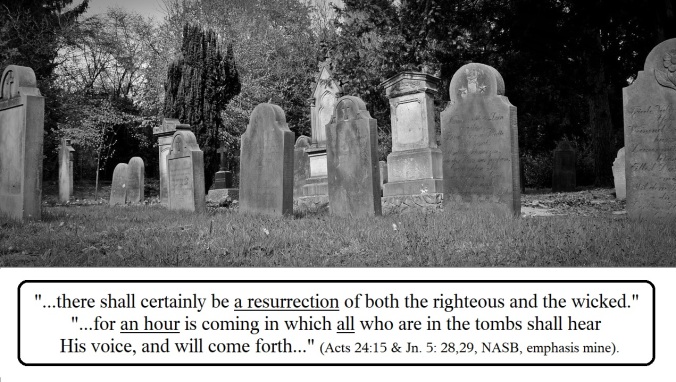“Go therefore and make disciples of all the nations…teaching them to observe all that I commanded you; and lo, I am with you always, even to the end of the age” (Matthew 28:19-20, NASB).
——————–
Contents:
1) Not Realizing the Value (Tom Edwards)
——————–

-1-
Not Realizing the Value
Tom Edwards
The story has been told about a poor, starving man in tattered clothes who entered a music shop in London on an extremely cold winter’s day. With him was an old violin and the hopes of selling it in order to buy some food.
In hearing of the man’s urgent need, the store owner offered him a guinea for the instrument, which was the equivalent of about $5 back around 1820 when this story takes place. With much thankfulness the shabby man accepted the offer and made his way back out into the chilly night.
Mr. Betts, the store owner, had bought this violin without even trying it out first or closely examining it. But he then did so, after the seller had left. And how overwhelmed the buyer now was when hearing not only the rich, mellow tones that the violin could produce, but also after lighting a candle to see the writing within the instrument, which said, “Antonio Stradivari 1704”! It was that famous Stradivarius that had been missing for a hundred years and earnestly sought after throughout Europe.
This particular violin has been owned by different people down through the years and is still also given the name of “the Betts,” due to the story behind it. It has been referred to as “one of the four or five greatest violins in existence today” and is part of the Cremonese Collection in the Music Division of the U.S. Library of Congress, thanks to Mrs. Gertrude Clarke Whittall who had purchased five of Stradivari’s instruments in 1934 and 1935, including the “Betts.” In addition, she also contributed the funding for the building of the pavilion wherein they are now kept and displayed. It was completed in 1939.
Some of Stradivari’s instruments today are said to be valued at millions of dollars – which certainly would include the “Betts”!
So that poor, starving man who had entered that music shop, almost 200 years ago, did not realize the wealth he actually had in his possession. And perhaps he never did find out the great worth of what he had parted with. From our perspective, it was unfortunate he did not realize. For though he was paid, how temporal that was – and especially compared to what he could have had (if he only knew).
Did he soon return to a destitute state after that money was gone? And, if so, did he remain that way a long time? For to live on the equivalent of $5 in 1820 would be like someone having only about $96 to live on in 2016. That would not last too long, would it?
Even more unfortunate, however, than that lack of knowledge the poor man had about his violin, is when individuals do not see the great value in having Jesus Christ and God’s forgiveness in their lives. For what could be more needful for our souls than that?
But what do so many “sell” their souls for? Only for that which is ever so brief when compared with eternity – yet can keep one out of heaven forevermore if God’s way of pardon is rejected — and Jesus wants us to realize this. He, therefore, declares in Matthew 16:26, “For what will it profit a man if he gains the whole world and forfeits his soul? Or what will a man give in exchange for his soul?” That is certainly something worth remembering — the great value in having our souls right with God! It should mean more to us than anything else! And though some might think that sounds selfish, it is actually the exact opposite. For to be right with God also involves unselfishly treating others the right way, out of a love and concern for them, as the Bible teaches!
This particular Scripture must have been in the mind of A.J. Hodge when he wrote in 1923 the following hymn, entitled, “Have You Counted the Cost?” Here are its first two stanzas and chorus:
“There’s a line that is drawn by rejecting our Lord,
Where the call of His Spirit is lost,
And you hurry along with the pleasure-mad throng,
Have you counted, have you counted the cost?
“You may barter your hope of eternity’s morn,
For a moment of joy at the most,
For the glitter of sin and the things it will win,
Have you counted, have you counted the cost?
“Have you counted the cost, if your soul should be lost?
Tho’ you gain the whole world for your own?
Even now it may be that the line you have crossed,
Have you counted, have you counted the cost?”
In counting the cost, one should give serious thought to what really is going to be of greatest value in the long run. And will it be worth striving for and paying whatever price is necessary to obtain it? Will it be the way of sin? Or the way of following after Christ? And which way will ultimately lead to the best destination? Perhaps when thinking of these things the choice will become easier to make. And the Lord does want every accountable person to give earnest thought to it and to make the right choice, just as He did toward the people of Isaiah’s time, when saying,
“’Come now, and let us reason together,’ says the LORD,
‘Though your sins are as scarlet,
They will be as white as snow;
Though they are red like crimson,
They will be like wool.
“If you consent and obey,
You will eat the best of the land;
But if you refuse and rebel,
You will be devoured by the sword.’
Truly, the mouth of the LORD has spoken” (Isa. 1:18-20).
The allurement of sin, along with the pleasure some wrongdoing can bring, has kept many in its hold and also continues to lay its snare for others as well. But let us be encouraged by people like Moses who “when he had grown up, refused to be called the son of Pharaoh’s daughter, choosing rather to endure ill-treatment with the people of God than to enjoy the passing pleasures of sin, considering the reproach of Christ greater riches than the treasures of Egypt; for he was looking to the reward. By faith he left Egypt, not fearing the wrath of the king; for he endured, as seeing Him who is unseen” (Heb. 11:24-27).
Moses had the right perspective. His focus was on God. For He was of much greater value to Moses than what this world had to offer — and even worth suffering for! Would not the world be a better place if more were like him in having that same dedication to the Lord?
Notice, too, how sin is referred to in that passage as “passing pleasures,” or the “fleeting pleasures” (ESV), the “short-lived pleasures” (WNT), the “temporary pleasures (Darby), or “the pleasures of sin for a short time” (NIV, ISV). For regardless of how long we could recklessly indulge in iniquity, it would always be a brief time compared to eternity. And this “world,” as John writes, “is passing away, and also its lusts; but the one who does the will of God lives forever” (1 Jn. 2:15-17).
Folks sometimes don’t realize the great value of things that are available to them. It really sounds ironic, but hear what the Lord said to some of those whom He addressed while on earth: “You search the Scriptures because you think that in them you have eternal life; it is these that testify about Me; and you are unwilling to come to Me so that you may have life” (John 5:39, 40). How blind they were! That true life was right there in front of them, but they rejected Him — the One who was and is “the way, and the truth, and the life” (Jn. 14:6). So Jesus is not just “a way,” but “the way” — that is, the ONLY way. For He goes on to say in the same verse that “no one comes to the Father but through Me.” In speaking to the rulers and elders of the people, Peter declared of Jesus that “He is the STONE WHICH WAS REJECTED by you, THE BUILDERS, but WHICH BECAME THE CHIEF CORNER stone. And there is salvation in no one else; for there is no other name under heaven that has been given among men by which we must be saved” (Acts 4:11,12).
Think of all the people who came into contact with Jesus and never realized that He was God in human flesh (cf. Jn. 1:1-3,10-11,14). That, by far, is the worst thing one could be ignorant of. For as Jesus declares, “unless you believe that I am He, you will die in your sins” (Jn. 8:24).
God’s word itself is a treasure worth more than silver and gold! Cf. Psa. 119: 72,127; Psa. 19:7-11. And to ignore the word of the Lord is to “neglect so great a salvation,” which leaves the person in a situation of no escape from the penalty of God’s wrath upon the transgressor (cf. Heb. 2:1-3).
Let us, therefore, never forget the great value we have in Jesus Christ and His word — in having sins forgiven and being in a spiritual relationship with God. For to forfeit our soul, as Jesus speaks of in Matthew 16:26, is to also lose out on these needful blessings of the Lord and of the eternal life in heaven that He would want all to have (cf. 2 Pet. 3:9). That’s why there is such tremendous worth in entrusting our souls to our Creator through our faith and obedience to His word – and may we never forget the supreme value of that! For even though we might not have much money in the bank, there is no amount that can even come close to the great value of all we have and will have for all eternity, as God’s children, because of our Lord Jesus Christ!
(All Scripture from the NASB unless otherwise indicated).
——————–
The Steps That Lead to Eternal Salvation
1) Hear the gospel, for that is how faith comes (Rom. 10:17; John 20:30,31).
2) Believe in the deity of Christ (John 8:24; John 3:18).
3) Repent of sins (Luke 13:5; Acts 17:30).
4) Confess faith in Christ (Rom. 10:9,10; Acts 8:36-38).
5) Be baptized in water for the remission of sins (Mark 16:16; Acts 2:38; 22:16; Rom. 6:3,4; Gal. 3:26,27; 1 Pet. 3:21).
6) Continue in the faith, living for the Lord; for, if not, salvation can be lost (Heb. 10:36-39; Rev. 2:10; 2 Pet. 2:20-22).
——————–
Tebeau Street
CHURCH OF CHRIST
1402 Tebeau Street, Waycross, GA 31501
Sunday services: 9:00 a.m. (Bible class); 10 a.m. & 5 p.m. (worship)
Wednesday: 7 p.m. (Bible class)
evangelist/editor: Tom Edwards (912) 281-9917
Tom@ThomasTEdwards.com
http://thomastedwards.com/go (Older version of Gospel Observer website without pictures, but back to March 1990)
http://tebeaustreetchurchofchrist.org/
http://ThomasTEdwards.com/audioser.html (audio sermons)








